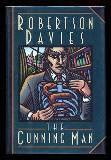 Since I am focusing this week on the pithy, ever erudite, and always witty sayings of Robertson Davies, I thought I would write a wee bit about one of his books.
Since I am focusing this week on the pithy, ever erudite, and always witty sayings of Robertson Davies, I thought I would write a wee bit about one of his books.The Cunning Man.
Most readers will know of Davies [perhaps you were forced to read Fifth Business in high-school?] as a result of reading one or more of his fabulous trilogies. The Deptford Trilogy. The Salterton Trilogy. The Cornish Trilogy.
The Cunning Man was the second of an intended fourth trilogy, which would most likely have been entitled The Toronto Trilogy. The first volume of which was the excellent novel Murther And Walking Spirits, followed by The Cunning Man, followed by the death of the great author, on December 2nd, 1995.
Davies (1913-1995), once commented that he knew "nothing about medicine" but had the highest degree of "hypochondriachal curiosity about it that is characteristic of authors." [source: his 1984 lecture entitled Can A Doctor Be A Humanist?]
Here in his final novel, Davies seems to have given vent to his curiosity in the creation of the character Jonathan Hullah... an unconventional physician who gains a reputation through his intuitive (albeit successful) diagnostic techniques. His specialty is dealing with patients considered hopeless by other doctors.
Lost causes.
For the eccentric Hullah, observation of, conversation with, and even "sniffing" of the patient brings him closer to an accurate prognosis than ever would an impersonal reading of a medical chart. Central to this holistic approach to medicine is Hullah's appreciation of not only the physical/biological aspects of man's nature, but also the mental and spiritual, and because of this understanding, he becomes known as the Cunning Man. It is a term borrowed from Robert Burton's The Anatomy Of Melancholy in a passage that appears on Davies' title page:
"Cunning men, wizards, and white witches, as they call them, in every village, which, if they be sought unto, will help almost all infirmities of body and mind... The body's mischiefs, as Plato proves, proceed from the soul: and if the mind be not first satisfied, the body can never be cured."
Through all of the great doctor's associations (as all the while, it applies also to himself) we find this theme played out... that to be truly healthy one must pay attention to more than merely the physical machine of the body.
In particular, in this story, when a certain Father Hobbes drops dead during a church service, Dr. Hullah suspects that something is amiss. However, he is prevented from performing a more complete examination by his old schoolmate, the mystical Father Iredale.
Some 20 years later, a journalist doing a series on Old World Toronto prompts Hullah to ruminate on the circumstances surrounding the death of the saintly priest. In doing so, Hullah ranges far and wide, recalling his rural upbringing in northern Ontario, his life-changing encounter with a native American medicine woman, his education at an elite boarding school, his rowdy extracurricular activities with a troupe of actors, and his wartime experiences as a doctor.
Typical of Davies’ work, the main focus is on what I would call “character delineation”, and in the curious subjects which arise through Hullah’s reminiscences. These include medieval saints tales, Anglican ritual and especially Church music, acting (drama/theatre), a somewhat psychosomatic theory of disease, church politics, some Freudian psychology, and a great deal more.
Davies loved to dabble in the esoteric, the arcane, the unusual.
Indeed, he has been called (I think appropriately) “the magic unrealist.”
I enjoyed this story, but at the same time, it is not Davies' finest book.
It does not have quite the plot-strength of any of his other ten novels, but having placed such a disclaimer, I would add that reading anything by Davies is better than to have not read him at all.
Highly recommended, here at Bookpuddle.
In premonition-like fashion, we find in the last paragraph of The Cunning Man, which was to be Davies last completed novel.... the following words:
...this is the Great Theatre of Life. Admission is free but the taxation is mortal. You come when you can, and leave when you must. The show is continuous. Good-night.
********
No comments:
Post a Comment
Thank you for your words!